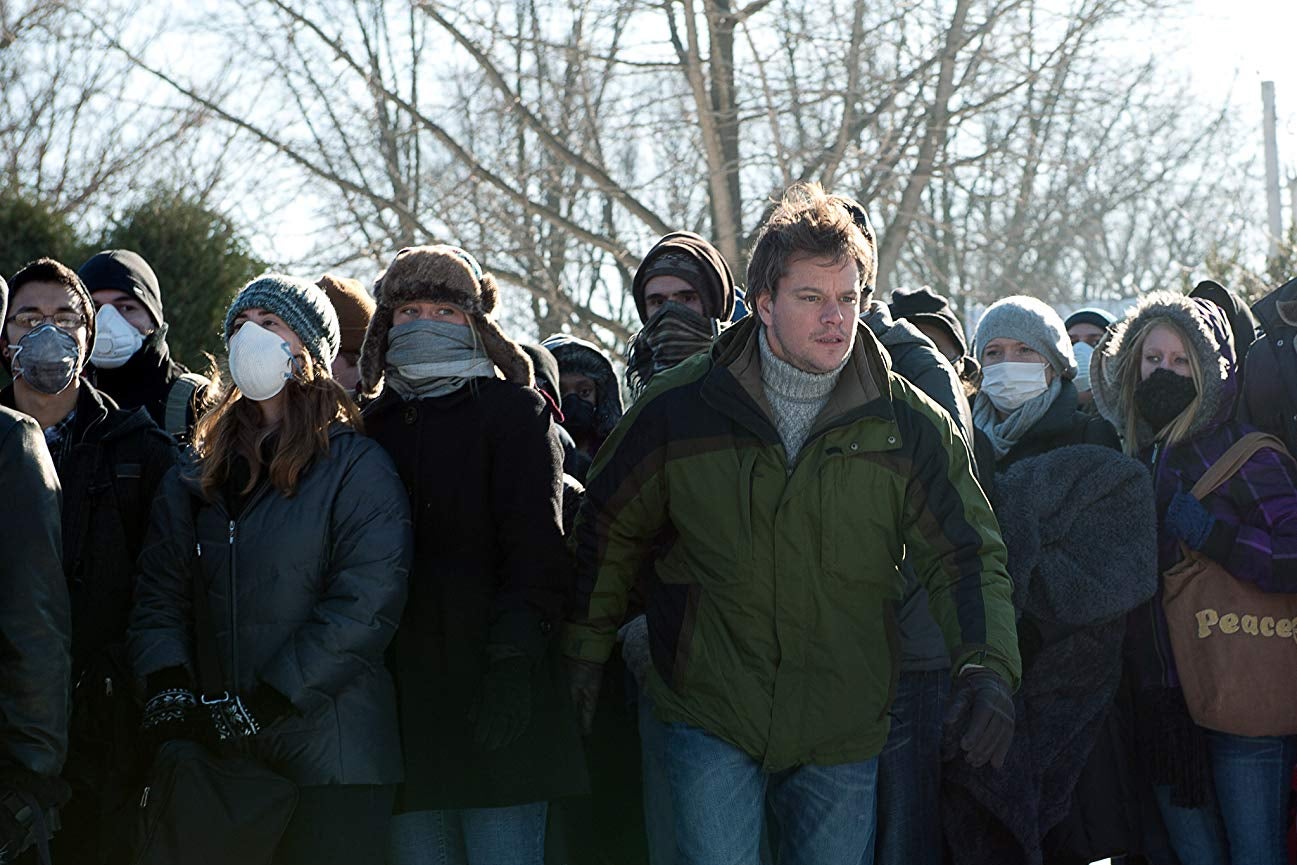Steven Soderbergh’s new disaster movie, Contagion (Warner Bros.), about a global pandemic that wreaks havoc on Oscar winners, may be the world’s most masterly Purell advertisement. You’re likely to think twice about grabbing the theater-door handle on your way out, and I can confess that one viewer found himself wondering whether he did, in fact, feel a disconcerting tightness in his throat. An early sequence depicting the spread of the virus (“The average person touches their face three to five times every waking minute,” an expert claims) is enough to make you want to go all Howard Hughes. Whether this alarm is justified is a topic best left for a separate debate, but one thing is certain about Soderbergh’s latest: It’s a damn effective thriller.
Opening with a cough over a black screen and fading in with a title reading “Day 2,” Contagion takes off in medias res and doesn’t relent. The cougher, we soon learn, is Beth Emhoff (Gwyneth Paltrow), who’s just returned from Hong Kong with a carry-on supervirus. As in the closing credits of another recent and effective thriller, Rise of the Planet of the Apes, the deadly virus soon begins racking up frequent flyer miles, and a wordless globe-trotting montage swiftly establishes the bird-flu-like disease as a worldwide killer. Activated to fight the plague’s spread are battle-tested CDC director Ellis Cheever (Laurence Fishburne), Cheever’s determined field operative Erin Mears (Kate Winslet), and World Health Organization investigator Leonora Orantes (Marion Cotillard). Meanwhile, Mitch Emhoff (Matt Damon), boards up his house against infection, a collapsing society, and (in the film’s most touchy-feely subplot) his daughter’s incorrigible boyfriend.
If this sounds like a lot of characters already, I haven’t even mentioned the fringe blogger (a lovely-to-hate Jude Law), the vaccine hunters (a standout Jennifer Ehle and a dead-in-the-face Demetri Martin), or the virologist played, with scene-stealing puckishness, by Elliott Gould. But Soderbergh often displays the height of his powers when orchestrating ensemble casts, and Contagion is no exception. While several of these actors are able to imbue just one or two lines with a whole character, Damon is particularly affecting—beneath the latest in a series of terrible haircuts, he provides the film’s relatable heart. (In the scenes where he talks with his daughter, played by promising debut actress Anna Jacoby-Heron, you may find that the tightening in your throat isn’t just the lethal virus.) Kate Winslet is restrained but lives up to her head-of-the-class reputation even in an unusually small role.
Traffic employed a network narrative (think Babel, Magnolia, Crash) to demonstrate the human cost of the drug war, but in Contagion the network forms the narrative itself. Not only does our globalized world provide the web to spread a pandemic in days, but our technologies (Roger Ebert’s preferred term for network narratives is “hyperlink movies“) allow information to spread just as virally and with just as little vetting. Thankfully, Contagion adopts multiple views on this, too (blogging fares poorly; social media, a little better; and a texted emoticon has surprising heft) and shows how the official message can be just as narrow and unsatisfying as the hearsay spread by Facebook. While the movie never rises to the level of allegory, it’s these zeitgeisty touches that make Contagion worthwhile in a genre that’s already seen such serviceable predecessors as Outbreak and The Andromeda Strain.
Soderbergh has lately become something of the Brett Favre of American auteurs: He’s always threatening to retire. But Contagion makes a strong case that he should stay. Contagion’s highly visual storytelling shows a love of cinema in nearly every frame, from the Traffic-like crafting of different color schemes for each hot zone, to the crisp state-of-the-art digital cinematography, to Stephen Mirrione’s masterclass editing. (If anyone deserves an Oscar nod, it’s Mirrione.) Another returning longtime collaborator of Soderbergh’s is Cliff Martinez, whose propulsive electronic score is reminiscent of the recent work of another former rocker, Trent Reznor, and is almost as forceful.
If Contagion is a “horror movie,” as Soderbergh has described it, then you can think of it as the most believable zombie movie ever made. A dangerous new infection breaks out, is passed from dying victim to dying victim, and the distrust it engenders sends society from state of emergency to state of nature. Through sign of the times touches, A-grade acting, and a mostly cliché-immune script (though the genre’s signature dead-monkey-in-a-cage shot does appear), Contagion elevates that well-trodden territory into something that feels both truly scary and fiercely contemporary. It’s a bleak ride, but in the end Contagion finally asks us to reach out to one another, across the distrust and no matter the divide—as long as we wash our hands first.
